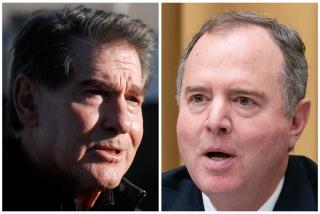Politics 88 : Blames Establishment : Gephardt Aims Tough Talk at Strategic States
- Share via
MARSHALL, Tex. — Standing on plastic covering gooey red mud at the foot of an oil drilling rig in East Texas, Rep. Richard A. Gephardt (D-Mo.) railed against U.S. oil imports, blaming them for the loss of American jobs and tensions in the Persian Gulf.
“By us not having stable oil prices in America, we ran the whole economy through the wringer,” said the red-haired congressman, wearing a silver hard hat as he toured one of the few rigs still operating in Marshall.
“These are little independent entrepreneurial American companies that are trying to compete against what are government-run oil companies in other countries . . . “ he said.
And finally, there is the familiar punch line.
“Don’t you think it’s time we had a President in this country who stood up for the rights of American workers and American business again?”
Visits Troubled States
Gephardt is now taking his message of woe in America to more of the nation’s troubled states, where boom has turned to bust, where hard times make welcome his promises of change, where frustrations are soothed by his anti-Establishment populism.
“We’re looking first at (states with sizable) delegate numbers,” said Gephardt spokeswoman Ali Webb. “But we’re also going to places where we think his message will connect.”
These places include South Dakota, where many farmers have not recovered from record foreclosures, and Texas, Oklahoma and Wyoming, whose economies were ravaged by declining oil prices.
Over and over again, Gephardt portrays the United States as a nation in decline, its jobs going abroad to foreign countries, its wages and standard of living slipping. He blames the malaise on the “Establishment” and pledges to take on “vested interests” and “make America strong again.”
Just as this get-tough message appealed to farmers in Iowa, it also stirs hard-hit farmers in South Dakota and workers in states where the economies are heavily dependent on oil.
Repeats Same Themes
Mindful of his opponents’ accusations that he adjusts his platform according to his audiences, Gephardt is careful to repeat the same themes in every state he visits. Only the emphasis changes.
Speaking to a group of auto workers at a union hall in Grand Prairie, Tex., Gephardt pledged to get tough with countries that restrict U.S. exports. But unfair trade practices alone are not responsible for the loss of jobs to competitors abroad, he told the workers. He blamed corporate America for spending more time on “mergers and takeovers” than on their employees and customers.
“We don’t have a worker problem in this country,” he said. “We have a management problem, and we’ve got to get the managers to manage correctly so that we can be productive and high in performance.”
To oil workers, he emphasizes his support of an oil import fee. “It makes me angry that we are dependent on OPEC for our oil,” he told an outdoor rally in Oklahoma City, addressing a state hurt by falling oil prices.
Gephardt is counting on the power of his message to compensate for what he lacks in money and organization, which are dwarfed by the resources of rival Massachusetts Gov. Michael S. Dukakis. Gephardt pollster Edward Reilly said public opinion surveys show that Gephardt’s trade message will sell well among conservative Southern Democrats who often defect to Republican candidates.
Policy a Metaphor
These voters want a government that “stands up for American businesses and workers,” a government that is “an advocate of the American people,” Reilly said. Gephardt’s trade policy, which permits wholesale retaliation against countries that restrict U.S. goods, is a metaphor for a President who will insist on fair treatment for Americans, the pollster said.
A popular message alone is not enough, however. For Super Tuesday, the campaign has targeted Louisiana, Arkansas, Florida and Alabama in addition to Texas and Oklahoma, and needs money to get its message across on television.
Campaign aides say Gephardt’s recent victory in Iowa and second-place showing in New Hampshire have improved fund raising. He raised $400,000 in the week between Iowa and New Hampshire and another $600,000 since then toward a goal of $2 million by Super Tuesday, said Webb, the campaign spokeswoman. Another campaign aide said most of the money will be spent on television commercials, which will run just before the contests.
Gephardt’s strategy calls for good showings in Tuesday’s South Dakota primary and Wyoming’s March 5 county conventions to give him momentum and media attention for Super Tuesday on March 8, when 20 states with more than 1,300 delegates are up for grabs.
An internal campaign poll taken last week showed Gephardt more than 10 points behind Dukakis in South Dakota, where the governor outmatches him in staff and television commercial time. To reduce the spread, Gephardt launched a series of new TV commercials Friday night that ridicule Dukakis for once having suggested that Iowa farmers plant Belgian endive to improve the state’s farm economy, portray him as a Massachusetts tax-raiser and accuse him of having no trade policy.
Calls Ads ‘Comparisons’
Gephardt, who has criticized his opponents for running “negative” campaigns, insisted the ads were merely “comparisons of our positions on very important issues.”
Asked in a brief interview about the Belgian endive reference, Gephardt smiled and said: “Those are things he said in Iowa, and I think they’re kind of humorous. We’re not doing that in a strong and heavy way.”
In the South, Gephardt is making a concerted push in delegate-rich Texas. A Dallas Morning News poll released a week ago showed him with 27% of the state’s Democratic support, followed by the Rev. Jesse Jackson with 26% and Dukakis with 14%. The survey, taken before Dukakis’ New Hampshire victory, found 19% still undecided.
Gephardt also is counting on a good showing in Oklahoma, where he has spent more time than any of his rivals and where four of the state’s five Congress members have endorsed him.
Bill Crain, chief of staff for Oklahoma Lt. Gov. Robert S. Kerr III, a Gephardt supporter, said the candidate’s support for an oil import fee and tough trade and agricultural policies strongly appeal to Oklahomans. But in the end, he said, the candidate who “gets the most media” will win the state.
More to Read
Get the L.A. Times Politics newsletter
Deeply reported insights into legislation, politics and policy from Sacramento, Washington and beyond. In your inbox twice per week.
You may occasionally receive promotional content from the Los Angeles Times.











